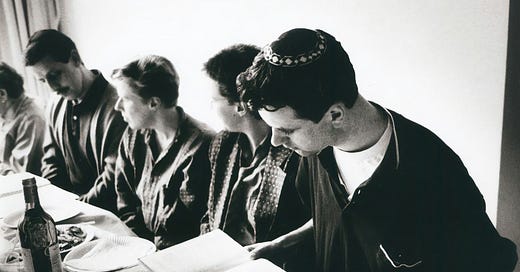Celebration or Condemnation? Human Rights and the Tenth Plague
As we prepare for the holiday, I thought to share this reflection on the plagues that we recite at the seder. As I’ve spoken about my Human Rights Haggadah in many synagogues over the last month, the morality of the plagues is the topic that’s come up most frequently.
Best wishes for a happy Passover to all who celebrate.
Shlomo
Many of us may be uncomfortable with the sweeping destruction of the Ten Plagues as we recite them at the seder. Particularly the final plague, the death of the firstborn, which the Torah takes pains to make clear affected every household in Egypt. Was it right to kill every firstborn, including children, even if the goal was to win the Israelites’ freedom?
Today we would in fact likely term such indiscriminate violence a war crime. The Israelites would have been justified in attacking Pharaoh or his taskmasters, but the Geneva Conventions would have prohibited the deliberate targeting of Egypt’s civilian population. What do we make of the fact that something which today we would roundly condemn and perhaps even punish is celebrated in our seder liturgy?
Olden Times vs Now
Some of us may resolve this tension by noting the difference between current and biblical times. The Geneva Conventions were only codified over the last century and of course in ancient Egypt didn’t apply. So we might regard the slaying of the firstborn similar to how the Torah treats slavery or animal sacrifices- normal, sensible, and even expected then but seen very differently today. Viewed in historical context, there is nothing unusual or remarkable about the Torah allowing the keeping of slaves or commanding the ritual slaughter of goats and sheep, and so we shouldn’t be surprised by the wartime killing of innocents in the Bible either. But even so, the Rabbis’ celebration of the plagues and their centrality at the seder may still be troubling.
Some may look to the custom of spilling a drop of wine as we read the plagues to symbolically lessen our joy as adequately expressing this discomfort. But is that enough, or is it like attempting to clean one’s hands of an atrocity with after-the-fact apologies? If this plague is something that requires us to be sorry and apologize for it, why does it maintain its central place at the seder?
God Did It
Some may find comfort in the fact that the Torah states clearly that the plague of the firstborn was carried out by God. Should any human have done such a thing, we would rightfully question their morality. But all-knowing God could not have harmed the innocent or done any wrong.
While this may sound appealing, here are two rebuttals to consider. First, God’s omniscience may also serve to heighten responsibility. When innocent people are harmed in war, often the explanation is lack of knowledge or lack of ability to adequately safeguard civilians while pursuing military objectives. An all-knowing and all-powerful God cannot give such an excuse.
Second, what happens when a leader comes and says that they are sure what God wants and are fighting to bring about God’s kingdom on Earth? What is to prevent them from then imitating God’s tactics in the Bible? If we accept that norms and rules do not apply to God, there is little to stop those who claim to be acting in his name.
All the Egyptians Were Guilty
The famous commentator Rashi explains that the plague of the first born was justified because all the Egyptians supported or benefited from the Israelites’ enslavement. Because of that they all deserved to be punished.
While this sounds appealing, such logic would certainly not be accepted under humanitarian law today. Civilians, who must be protected from attacks, are defined as those who are not members of the armed forces and do not take part in hostilities. Even if someone supports a political leader who commits atrocities or benefits from war crimes committed by their country they retain their protected civilian status.
This is crucial, for otherwise in nearly every conflict there would be grounds for wholesale destruction. In times of war populations tend to rally around their leader, and every leader must have at least some popular support to maintain their position. Allowing citizens to be targeted due to their political opinions would undo the limits on death and destruction the laws of armed combat set out to achieve.
Remains a Question
So how do we explain the plagues at our seder? Some of us may find some combination of the above answers satisfying, or have other explanations as well. Or we may come to believe that this section of the Passover story is in fact at odds with our values and search for a proper way to articulate that at the seder. Human rights or humanitarian principles may at times conflict with the Jewish tradition, and how we reconcile this is an important question for those of us who are committed to both.
Personally, I state clearly at my seder that the killing of the firstborn was wrong and would today be considered a war crime. But that only serves to illustrate how far we’ve come in developing the expectation of wartime restraint. The dilemma of how to fight for a just cause, such as freedom from slavery, without impermissibly violating the rights of innocent people is just as relevant and difficult today as in ancient times. The seder presents a wonderful opportunity to discuss this, and we will likely find that even among friends and family who share our core values different opinions abound.
A version of this article originally appeared in The Algemeiner.



